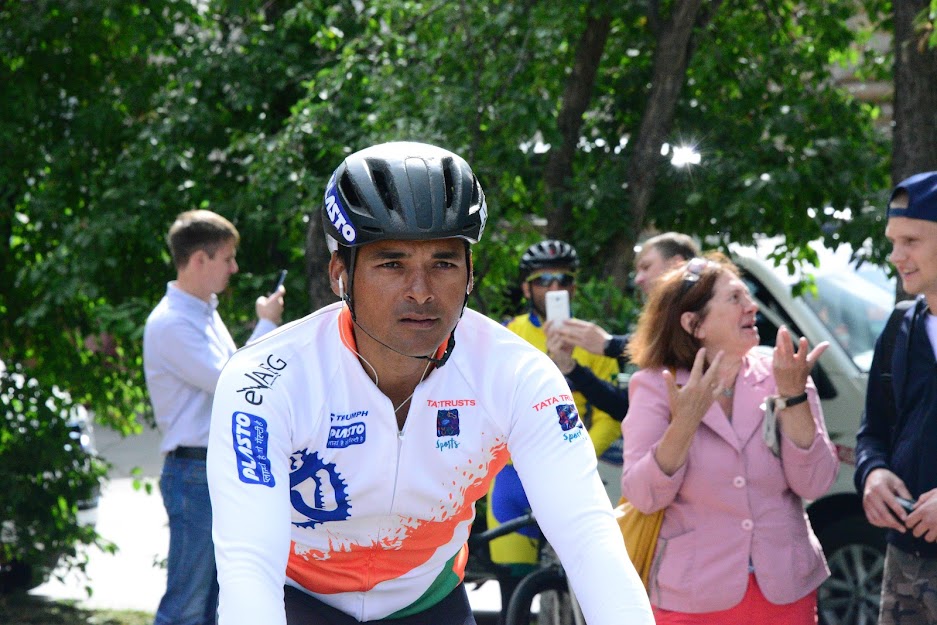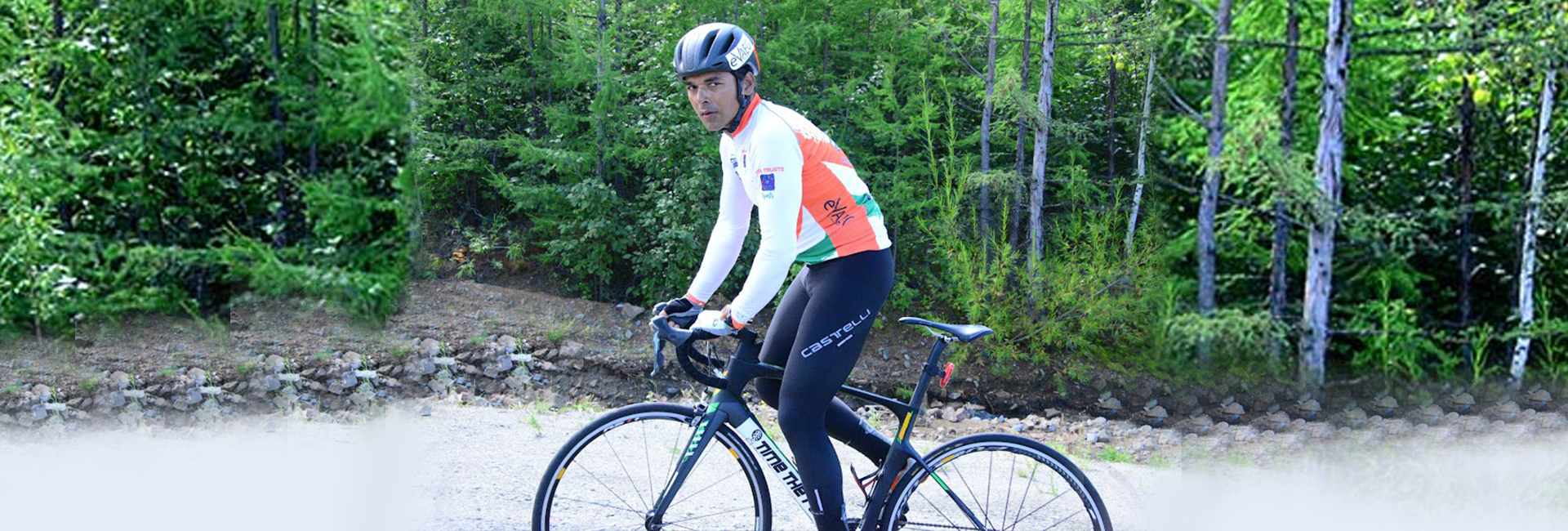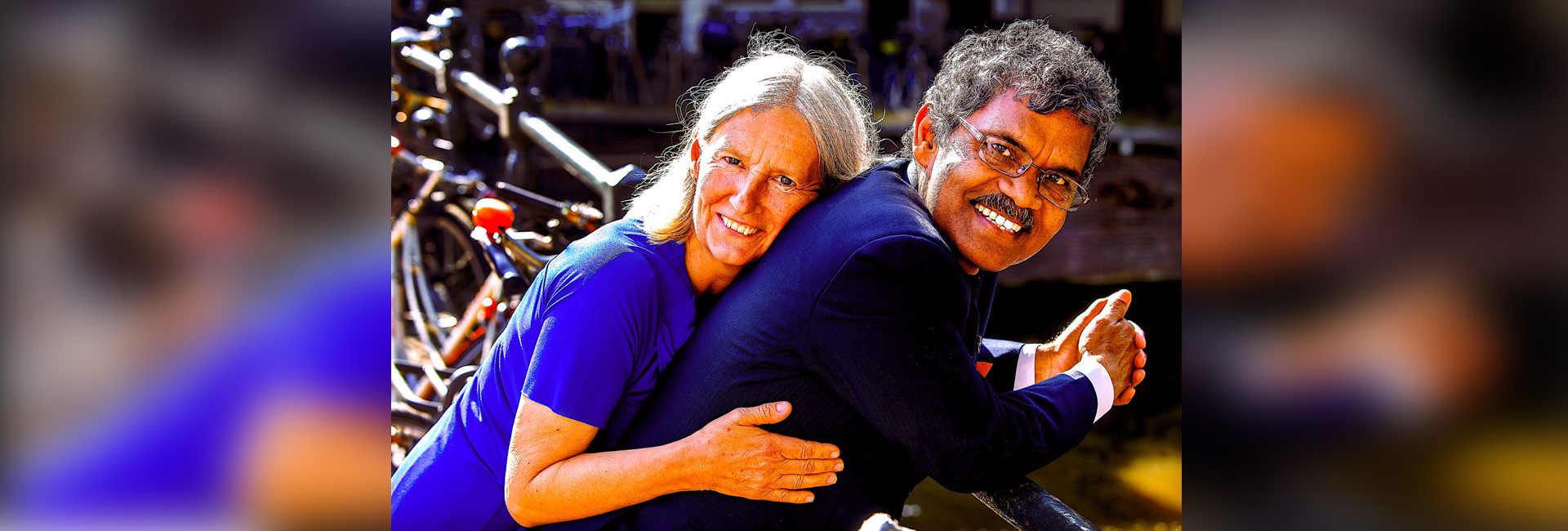(December 18, 2022) When he arrived in Moscow to undertake a gruelling, 9100-km bicycle journey (from Moscow to Vladivostok) in August 2018, a mountain of challenges awaited Dr Amit Samarth. As part of the Red Bull Trans-Siberian Extreme — the longest bicycle stage race on the planet — the ultra cyclist was all set to cover the mind-boggling distance in 15 stages in 25 days.
The weather conditions were extreme and the hilly terrain most difficult. The professional bicyclists were to ride massive distances, ranging from 260-kms to 1364-kms in different stages.

Dr Amit Samarth
Only those with an iron will and nerves of steel could make it. Dr Amit Samarth was one of them.
The wilderness of Siberia
“The rain water in Siberia is ice cold and I ended up riding the 10th stage (1054 kms) in heavy rain. TheTrans-Siberian Extreme was a killer, the toughest challenge ever,” smiles Dr Samarth, the first Indian and Asian to have completed the challenge despite massive odds.
In an exclusive conversation with Global Indian, the ultra-cyclist and marathoner, for whom taking on extreme challenges is now a way of life, says that unless risks are taken, one can never realise their capabilities.
If the Trans-Siberian Extreme proved to be the toughest, the Race Across America (RAAM), solo 2017 was another event that tested Dr Samarth’s endurance. It was a 5000-km continuous bike race from East to West Coast and participants get 12 days to finish.
The Race Across America
“In extreme endurance sports like ultra-cycling, there come occasions when you fall sick or just don’t feel great. During RAAM, I got very dehydrated once and suffered from a throat infection later,” says Dr Samarth, the first Indian solo to finish RAAM in 11 days, 21 hours and 11 minutes, which in itself was a record in the history of RAAM.
While the Trans-Siberian Extreme had an elevation of 77,320 metres, RAAM had a total elevation of 40,000 metres.

Amit Samarth during the 15th stage (Khabarovsk – Vladivostok) of the Red Bull Trans-Siberian Extreme, on August 17, 2018
Studious boy to adventure junkie
Born and brought up in Nagpur, Maharashtra, Dr Samarth’s childhood was in complete contrast to what he is today.
In school, Dr Samarth says he was a chubby boy, often poked fun at by his classmates. He recalls trying to enroll for the National Cadet Corps and being rejected on grounds of his physical fitness.
“My focus was only on academics. Since medical admissions were based on a student’s marks in physics, chemistry and biology, it was very important for me to focus only on studies,” says Dr Samarth, who recalls playing ‘gully’ cricket once in a while. In college, though, he began going to the gym.
Focus on public health
Having done his MBBS from Indira Gandhi Medical College in Nagpur, Dr Samarth, who is now in his early 40s, spent the next couple of years working as a medical officer in various hospitals. After that, he received an opportunity to visit the International Centre for Diarrhoeal Research in Dhaka, Bangladesh, where he met a lot of public health scientists from different universities all across the world. “That is where I actually understood what public health is and what it can do,” says Dr Samarth.
He went on to do earn a Master’s degree in Public Health from Johns Hopkins School of Public Health in the US. When he returned to India, Dr Samarth did stints at the Indian Institute of Public Health, Access-Health International in Hyderabad and then moved to Bengaluru, taking over as the CEO of the Save A Mother Foundation.

Taekwondo to marathons
In Hyderabad, he took to Taekwondo. “I used to get up at 4.30 am and go to KBR Park for training. I used to train in the evenings as well,” says the ultra-cyclist, who went on to earn a black belt in the martial art.
In 2015, he quit his job at Bengaluru and returned to his hometown, Nagpur, where he started his sports academy, Miles and Miles. Encouraged by his friends, he took to Ultra Cycling himself, participating in various cycling events.
His passion for marathons began relatively late in life and was sparked by the running he did for Taekwondo training. His life changed the day he decided to attempt a 10-km run. “I then started doing half-marathons. After I got married in 2010, I started running full marathons,” Dr Samarth says.
The Ironman Triathlon
Along the way, he discovered the Ironman Triathlon, a series of long-distance triathlon races, organised by the World Triathlon Corporation. The triathlon comprised comprises a 3.9-km swim, a 112-mile bicycle ride and a 42.2-km marathon run, all completed in a single day. It is an advanced challenge, touted to be one of the most difficult one-day sporting events in the world, to be completed in around 17 hours.
It compelled Dr Samarth to purchase his first bike and he has been unstoppable ever since. Over the last decade, since 2012, the ultra-cyclist and marathoner has done three full Ironman triathlons and 17 half-Ironman-races across the world.
“I come from a farming family and we have the willingness to suffer, a trait required for ultra-cycling and marathons. I am not a born athlete but a trained one,” says Dr Samarth, who also did a 6000-km cycling event on India’s Golden Quadrilateral highway in a record time of 13 days, 9 hours and 50 minutes.

Sleep deprived
For races like RAAM and TSE, Dr Samarth would be required to be sleep deprived for many days. “When I was riding for RAAM, I went riding continuously for the first 24 hours. Thereafter, I used to be on the bike for 21 to 22 hours everyday and sleep for around 1.5 to two hours everyday,” informs Dr Samarth adding that riding without proper sleep is part of the sport.
He says one has to think and behave like a ghost, which is what he did during TSE. “It is very hard to explain how to do this. But I did a lot of ghost riding in TSE. One has to think as if you are possessed with some spirit and your thinking will make things happen,” says the ultracyclist, who would talk to himself on the lonely roads all night to reaffirm the belief that he would successfully finish the race.
One of the best way to deal with sleep deprivation and lonely night rides is music. “I take a music player along and play my favourite tracks. Singing along helped me to be more alert and ward off sleep,” says Dr Samarth, who did Ironman Phuket in 2012 (1.9 km swim, 90 kms cycle and 21.1 km run) and Ironman Bahrain (70.3) in 2018.
Few tough moments

Sharing a few more difficult situations he faced during TSE and RAAM, Dr Samarth recalls the 10th day in RAAM, when he was in West Virginia. It was raining heavily and he was riding in rain from 5 pm in evening to almost 2 am in the night.
“It was very cold that night. One of the biggest mistakes I did was taking a break and falling asleep,” he says. Instead of sleeping for one hour, he slept for three hours and then it became very difficult to start early morning due to intense cold. “I lost precious time due to which I had to slog for the next 24 hours to make sure I finish RAAM successfully,” he says.
During TSE, after completing the stage 3, Dr Samarth was completely drained out due to lack of proper food and his legs had turned extremely sore. By evening, hewas running high temperature.
“I had only 10 hours to sleep and recuperate. I tried to eat and sleep as much as possible, took medicines and evaluated myself next morning. That day I rode slower, trying to recover my body on the bike. Yes, you can recover while on the move,” smiles the ultra cyclist, who suffered dehydration with altitude sickness during one of the races in the Himalayas.
“If I get bogged down or afraid of these situations, I would have never finished those races,” he points out.
Giving back
Earlier, he won the tough Pune tough cycle race and also did some other ultra-cycling rides from Delhi to Nagpur (1021 km in 39 hours), Chennai to Nagpur (in 43 hours). “I have taken those risks and I want to do my bit towards encouraging people to pursue their passions,” says the ultra risk taker.
What are his future plans? “I would like to grow my sports academy and I am presently running a program for tribal athletes,” informs Dr Samarth. His earlier visits to the Deshpande Foundation in Hubbali, which put him in contact with many social entrepreneurs, inspired Dr Samarth to be a sports entrepreneur himself.
View this post on Instagram
He intends to identify more sporting talent from the tribal areas, especially from central India, and train them in his sports academy. “I look forward to create elite national and international athletes from my academy in the time to come,” says the sports entrepreneur, who is doing his bit to give back to the society.
When he isn’t ultra-cycling or marathoning, the fitness enthusiast likes to read books and watch some informative videos about training athletes.




